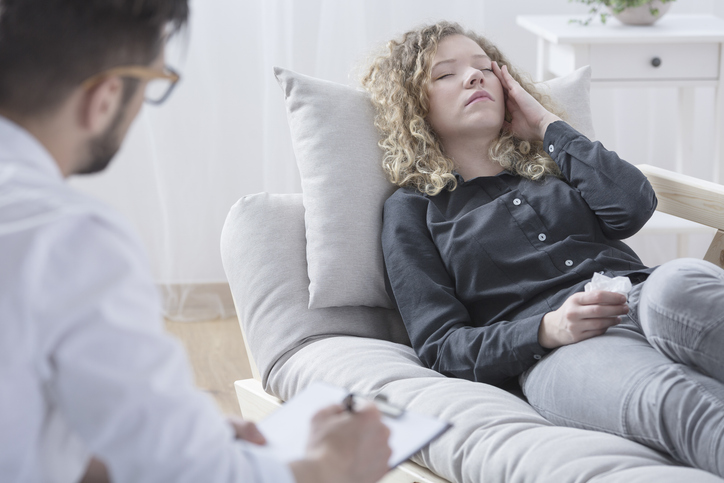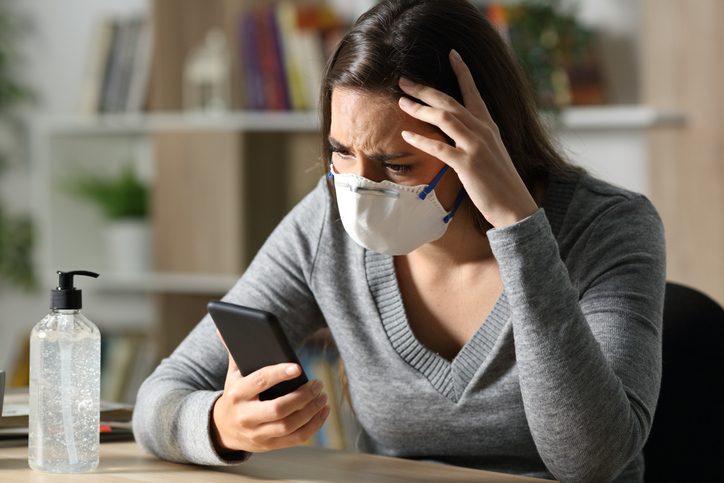You’ve probably heard the term “hypochondriac” to describe someone who worries a lot about their health, goes out of their way to avoid germs, or spends significant time looking up health conditions online. People sometimes use this term in a negative way to essentially call someone out for being “dramatic” about their health, but in reality, hypochondria isn’t a personality trait, it’s a mental health issue that can cause real distress for people.
Similar to “OCD”, which is still frequently used to describe people who are meticulous, the real meaning of “hypochondria” has been watered down socially. That’s why it’s key that we set the record straight on what this condition really is, what people who are dealing with it can do to improve their quality of life and more.
Here, psychologist Terri Bacow, PhD, the author of Goodbye, Anxiety, breaks down the realities of this issue.

Hypochondria is a sub-type of anxiety
However, this term is no longer the formal diagnosis.
“More specifically, in the DSM-5, what used to be called hypochondria is now two separate diagnoses - Illness Anxiety Disorder (IAD) and Somatic Symptom Disorder (SSD),” says Dr. Bacow. “Both of these are classified under a category referred to as ‘Somatic Symptom and Related Disorders’."
Both conditions involve health anxiety, but SSD involves physical symptoms as well, while IAD sufferers have minimal or no physical symptoms tied to their condition.
IAD and SSD share health anxiety in common as a symptom, but SSD requires the patient to report physical complaints. Those with minimal or no physical complaints or somatic symptoms are diagnosed with IAD.
There’s a difference between hypochondria and health anxiety
“People with health anxiety are worried about possibly getting an illness, while people with what a layperson would call hypochondria are worried that they currently *have* an illness or that some symptom they presently have is indicative of harm or disease,” says Dr. Bacow.
So, for example: Someone with health anxiety may fear what will happen in the future, while people with hypochondria will believe they already have a health condition.

With both conditions, people may feel compelled to engage in behaviors to keep them safe.
“For example, someone with health anxiety will try to prevent illness - they might stay home from a party, wear a mask, sanitize their hands, or think they are definitely going to get a brain tumor after hearing a news story about brain tumors,” says Dr. Bacow. “Someone with hypochondria may do some of these behaviors but typically out of concern that some sensation they currently have is indicative of something serious.
With hypochondria, people may make frequent visits to doctors or seek out validation for their belief that there’s something wrong with their health.
There’s an overlap between OCD and hypochondria
“The overlap is that it would not be uncommon for a person with OCD to fear illness and to especially fear germs that could cause illness and this can lead to safety behaviors like excessive hand washing and reassurance-seeking behaviors,” says Dr. Bacow.
“I can also envision a scenario where a person has OCD with behavioral elements of hypochondria such as repeated checking of one's temperature because they are convinced that germs gave them illness,” she adds.
Can OCD and hypochondria ever be confused with one another?
“I think if one is not a trained professional, it could be extremely easy to mix them up. Clinicians who are qualified diagnosticians, however, would be able to make the distinction by looking carefully at the [diagnostic] criteria for each,” says Dr. Bacow.
To meet the criteria for OCD, someone needs to have intrusive thoughts that are nonsensical and more extreme than typical "worry", and these thoughts need to be directly linked to compulsive behaviors. People with OCD also have intrusive thoughts about a variety of topics, not just health.

The increasing prevalence of health anxiety
The pandemic changed things
Not surprisingly, a major health catastrophe that completely dominated news cycles and fundamentally changed the way we go about life also affected the way people experience these conditions.
“The pandemic intensified the prevalence of health anxiety AND IAD/SSD - it worsened the experience of individuals already living with these mental health disorders and made it far more likely for people with genetic predispositions to anxiety to develop health anxiety and/or somatic symptom and related disorders,” says Dr. Bacow. “The pandemic made it easy for people to believe that ANY facet of illness they were experiencing was Covid-19 or that they were likely to get Covid-19. Covid became a huge target of focus and source of terror, really amplifying and worsening people's experiences.”
So did the Internet
Playing the “Dr. Google” game can lead anyone down a dread-filled rabbit hole. For people with baseline health anxiety, this can certainly exacerbate things.
“The volume of online health information has undoubtedly exponentially worsened the experience of hypochondria,” says Dr. Bacow. “ In the past, someone with IAD or SSD would need to make an appointment with a physician to seek reassurance. Now, literally, anyone can engage in doom scrolling and go down an internet rabbit hole to find confirmatory evidence that something is terribly wrong.”
“Many people with somatic symptom-related disorders have confirmation bias and will attach to any information that suggests that something is terribly wrong with them,” she adds. “Further, they are doing so without proper medical knowledge or training and jumping to conclusions from online lists of symptoms that may or may not be something threatening, without having the context to properly interpret what they are reading.”
Unlimited access to information can be a great thing, but it can also be incredibly overwhelming…and it can certainly reinforce anxiety and worry around health issues.
There’s a better way to deal with OCD or hypochondria
Ultimately, seeing a qualified therapist for cognitive-behavioral therapy (CBT) is a far more effective way to deal with this type of anxiety rather than allowing yourself to fall down a Google rabbit hole.
“CBT helps people understand the connections between thoughts (worry about illness), feelings (physical and emotional), and behaviors (doctor-shopping, excessive hand sanitizing),” says Dr. Bacow. “A CBT therapist would help someone break the cycle of hypochondriasis by targeting each of these three domains. For example, the client would be encouraged to gradually stop scrolling the internet or excessively calling their doctor, to tolerate the uncertainty of not knowing what a particular uncomfortable feeling might be, and to challenge the idea that it is anything catastrophic.
Zara Hanawalt is a freelance journalist and mom of twins. She's written for outlets like Vogue, Parents, Marie Claire, Elle, Cosmopolitan, Motherly, and many others. In her (admittedly limited!) free time, she enjoys cooking, reading, trying new restaurants, and traveling with her family.












.webp)



.png)







%20Muse%E2%84%A2%20EEG-Powered%20Meditation%20&%20Sleep%20Headband.png)

